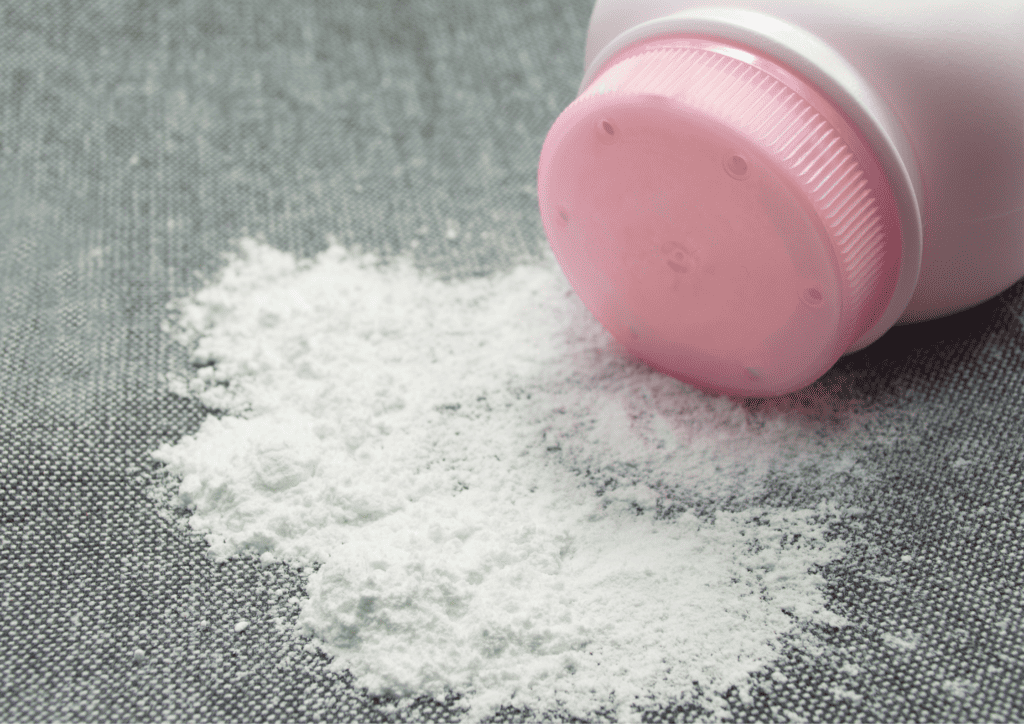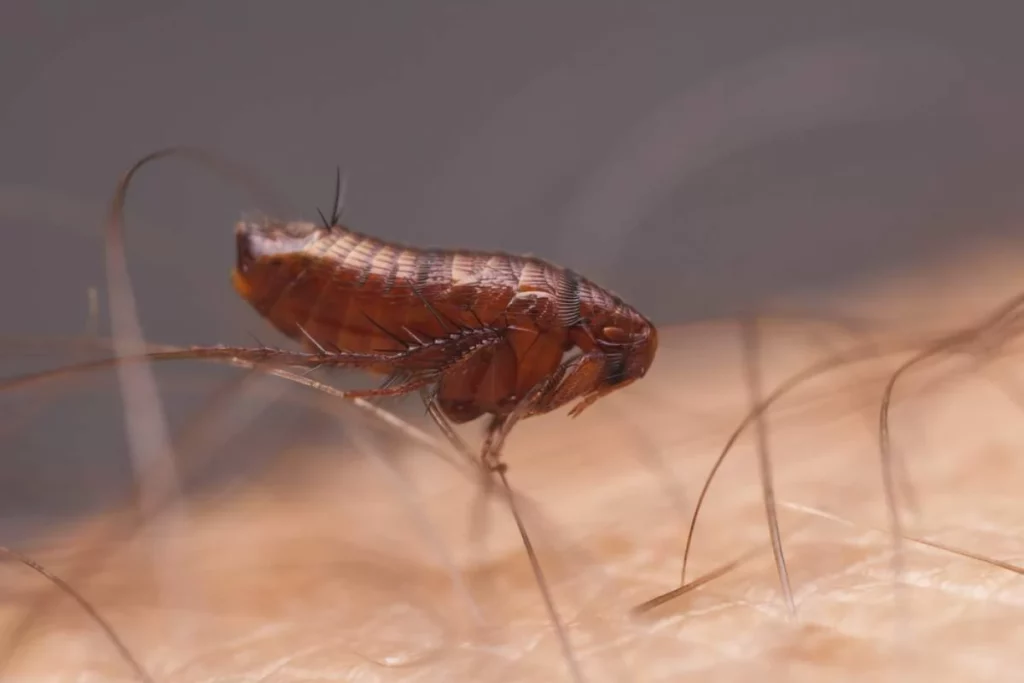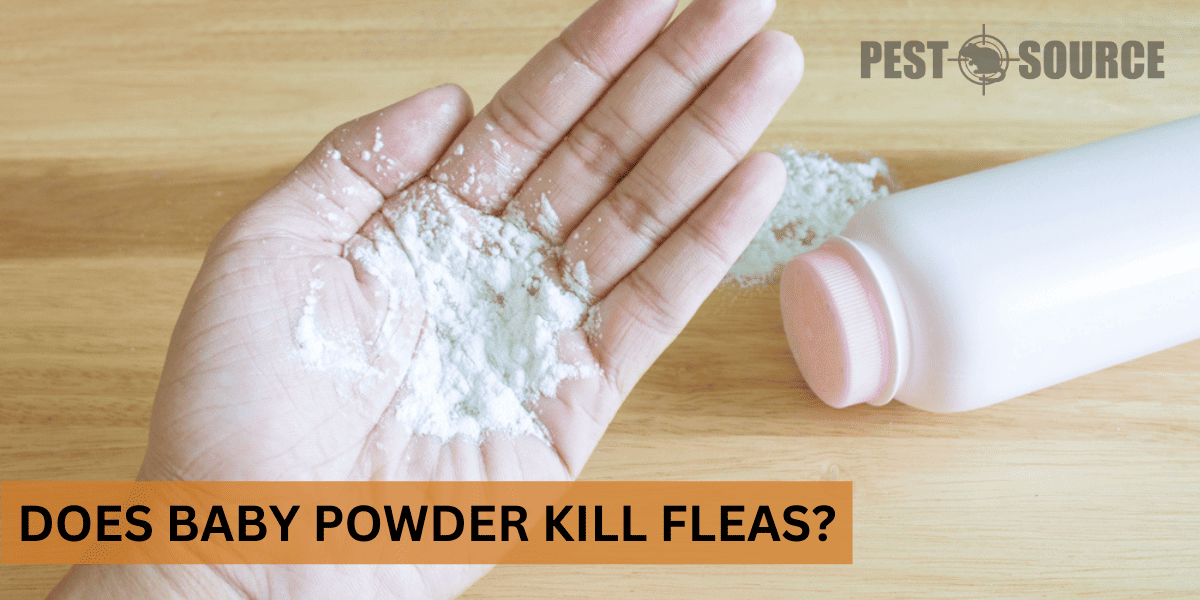When it comes to keeping our homes and pets free from fleas, finding an effective solution is essential. One common household item that has been suggested as a possible solution to a flea problem is baby powder. In this article, we’ll dive into how effective baby powder is in getting rid of these unwanted pests and explore its possible use as a home remedy for flea infestations.
POINTS
- Baby powder can kill fleas, but it’s not a consistently effective method, and its success varies depending on the type of pet and severity of the infestation.
- Baby powder can be harmful to both pets and humans, especially if inhaled or ingested, and long-term exposure to talc-based powders may be linked to certain types of cancer.
- Consulting a veterinarian is essential before using any home remedies, as they can provide professional guidance based on your pet’s individual needs and recommend safe, effective flea treatments.
- While baby powder may offer temporary relief from flea-related itchiness in pets, it’s more important to eliminate the fleas themselves rather than just treating the symptoms.
How Does Baby Powder Kill Fleas?

Baby powder is typically composed of talcum powder, which is a mineral-based substance, or cornstarch, which is a natural ingredient derived from corn. Both of these components are known for their moisture-absorbing properties, which leads to the question: Can these powders get rid of fleas? Let’s examine the process behind baby powder killing fleas.
How does the application of baby powder lead to flea suffocation?
To understand how baby powder can be a tool in the battle against fleas, it’s important to delve into the specifics of its action mechanism. The key lies in its ability to interfere with the fleas’ respiratory system and overall mobility. Below, we break down the process into several critical steps, shedding light on how this common household item can turn into a flea combatant:
- Blocking Breathing Pathways: Baby powder, when applied to fleas, clogs their spiracles—the tiny openings fleas use for breathing—effectively cutting off their air supply.
- Physical Suffocation: The fine particles of the powder physically cover the flea’s body, preventing air from reaching the spiracles and leading to the insect’s suffocation.
- Disrupting Mobility: Covered in baby powder, fleas lose their ability to grip surfaces, making it difficult for them to move and escape, further increasing their vulnerability.
- Life Cycle Interruption: The application of baby powder not only affects adult fleas but can also disrupt the development of eggs and larvae, reducing future infestation potential.
What is the process behind baby powder killing fleas?
Covering fleas in baby powder causes the insects to lose their grip on surfaces, making it difficult for them to move. This, in turn, makes them more vulnerable and harder for them to escape. The baby powder doesn’t just suffocate adult fleas; it can also disrupt the life cycle of the eggs and larvae, thus reducing the chances of further infestation.
Does baby powder attract or repel bugs?
There is a popular belief that baby powder tends to attract or repel bugs, but the evidence is not entirely consistent. While some insects may naturally avoid the baby powder, other insects such as ants may be attracted to it due to its sugar content. For fleas, however, the focus remains on the potential to suffocate the pests rather than to deter them.
The Use of Baby Powder for Fleas on Different Animals
Many pet owners have questions regarding the efficacy of baby powder as a flea treatment on different types of animals. While it may work in some cases, it’s essential to consider the safety and effectiveness for each type of pet individually.
| Animal Type | Efficacy of Baby Powder for Flea Control | Safety Concerns | Veterinarian Recommendation |
|---|---|---|---|
| Dogs | Inconsistent; may suffocate adult fleas | Potential respiratory issues and talc-related risks | Generally not recommended; consult for alternatives |
| Cats | Might provide temporary relief | Risk of ingestion and respiratory problems | Advised against; seek professional advice |
| Baby Kittens | Very limited information; not advised | High sensitivity; risk of health issues | Strongly discouraged; consult for safe treatments |
| Bunnies | Limited data; efficacy questionable | Ingestion or inhalation risks similar to cats and dogs | Not recommended; alternative treatments preferred |
Can baby powder kill fleas on dogs?

Baby powder has been reported to kill fleas on dogs by suffocating the insects. However, the effectiveness of this method is inconsistent, and using baby powder on dogs is not recommended by most veterinarians due to concerns regarding potential health risks.
Does baby powder kill fleas on cats?

Like dogs, cats may also benefit from baby powder for flea control. However, there are concerns regarding the safety and effectiveness of this method. Cats are prone to grooming themselves and may ingest the baby powder, which could lead to respiratory issues or other health problems.
How to get rid of fleas on baby kittens using baby powder?

Baby kittens have sensitive skin and are more susceptible to health issues associated with using baby powder for flea control. It’s advised to consult with a veterinarian for safe and effective treatment options suitable for kittens.
Is baby powder effective on fleas on bunnies?

There is limited information on using baby powder for flea control in bunnies. However, like cats and dogs, bunnies may experience health issues if the baby powder is ingested or inhaled. As a precaution, it is recommended to avoid using baby powder on bunnies and consult a veterinarian for more suitable treatment options.
Safety and Use of Baby Powder on Pets
Before considering the use of baby powder on pets, it’s crucial to understand the potential safety concerns and proper application methods.
Is baby powder safe for dogs?
There are concerns about the safety of using baby powder on dogs. Ingesting or inhaling baby powder could lead to respiratory issues and other health problems. Additionally, some baby powders contain talc, which has been linked to cancer when used in high amounts. Overall, it’s best to consult with a veterinarian before using baby powder on your dog.
Is baby powder safe for cats?
Similar to dogs, cats may also experience health issues from ingesting or inhaling baby powder. Cats groom themselves frequently, increasing the risk of ingesting the powder, which could result in respiratory and digestive problems. It’s recommended to consult a veterinarian before using baby powder on your cat.
Can you use baby powder on dogs and cats?
Though some pet owners have tried using baby powder as a quick fix against fleas, it is not generally recommended by veterinarians. The possible health risks and inconsistent effectiveness make it less favorable compared to other flea treatment options that have been designed and tested specifically for pets.
How to apply baby powder on dogs and cats safely?
If you decide to use baby powder on your pets, it’s important to apply it safely. Here are a few steps to follow:
| Animal Type | Steps for Safe Application | Key Precautions |
|---|---|---|
| Dogs | 1. Choose cornstarch-based powder 2. Apply in a well-ventilated area 3. Gently rub onto fur, avoiding face and eyes | Avoid talc-based powders; monitor for adverse reactions |
| Cats | 1. Use cornstarch-based powder 2. Apply sparingly, avoiding face 3. Ensure cat is in a ventilated area | Minimize risk of ingestion during grooming; watch for irritation |
| Baby Kittens | Consult with a veterinarian before application | Generally not advised due to high sensitivity and health risks |
| Bunnies | 1. Opt for cornstarch-based powder 2. Apply lightly, avoid breathing zones 3. Keep in ventilated space | Be cautious of ingestion and inhalation; seek vet advice for alternatives |
Remember, it’s always best to consult a veterinarian before trying any home remedy on your pet, as they can provide professional guidance based on your pet’s individual needs.
The Role of Baby Powder in Pet Itch Relief
Flea bites can cause itchiness and discomfort to pets. Baby powder has been suggested as a potential remedy to relieve pets from this itchiness.
Can baby powder help with itchiness caused by fleas on dogs and cats?

Baby powder has been known to provide temporary relief from itchiness caused by flea bites on dogs and cats. The powder absorbs moisture and can help alleviate irritation on your pet’s skin. However, it is important to be cautious with its use, as mentioned earlier, due to potential health risks.
How does baby powder help with itchiness in pets?
Baby powder can soothe and calm irritated skin by reducing inflammation and absorbing excess moisture from the pet’s skin. However, the primary goal should be to eliminate fleas rather than just treating itchiness. Consult a veterinarian for suitable flea treatment options to avoid recurring discomfort for your pets.
Comparison of Baby Powder and Other Types of Powders for Flea Control
Several types of powders have been suggested as potential flea control remedies. Let’s examine some alternatives and compare their efficacy to baby powder.
| Powder Type | Efficacy in Killing Fleas | Safety for Pets | Suitability for Long-Term Flea Control |
|---|---|---|---|
| Baby Powder (Talc-based) | Inconsistent; may suffocate fleas | Concerns with respiratory issues and potential cancer risks | Less ideal due to health risks |
| Baby Powder (Cornstarch-based) | Variable; some effectiveness in suffocation | Considered safer than talc-based; still requires cautious use | Potentially suitable but with reservations |
| Gold Bond Powder | Limited information; some anecdotal success | Possible irritants and allergens; not designed for pets | Generally not recommended for pets |
| Arm and Hammer Carpet Powder | Some effectiveness reported | Risks due to chemical content; not intended for direct application on pets | Not advisable for direct use on pets |
How does the efficacy of baby powder compare with other powders in killing fleas?
The effectiveness of baby powder in controlling flea infestations may vary, and not all powders will produce the same results.
Does cornstarch kill fleas?

Cornstarch is an ingredient found in some baby powder products and is considered safer than talc for pets. Though cornstarch is known to help control flea populations by suffocation, its effectiveness is inconsistent and not as reliable as other flea treatments.
Will Gold Bond powder or Arm and Hammer carpet powder kill fleas?

Some pet owners claim that Gold Bond powder and Arm and Hammer carpet powder can help control fleas. These products may provide temporary relief but are generally not as effective as conventional flea treatments. Additionally, they may contain chemicals that could be harmful to both pets and humans when ingested or inhaled.
It’s critical to explore safe and effective flea control options with the guidance of a veterinarian. Baby powder and other powders may offer some benefits, but they may not be sufficient for long-term flea prevention and control.
Can Fleas Suffocate?
We’ve discussed the idea of baby powder suffocating fleas, but is it actually possible to suffocate them using powders? Let’s explore the limitations of trying to suffocate fleas.
How do fleas suffocate and can they be suffocated using powders?

Fleas, like other insects, breathe through tiny openings called spiracles. When these spiracles are blocked by fine particles such as those found in baby powder, the fleas are unable to breathe and eventually suffocate. However, the effectiveness of suffocating fleas using powders can be inconsistent, as not all fleas may be affected by the powder application.
What are the limitations of trying to suffocate fleas?
Addressing a flea infestation through suffocation methods, such as using powders, comes with its set of challenges and limitations. Here are key points that highlight why this approach may not always be the most effective or practical solution:
- Challenging Coverage: Achieving complete coverage of all fleas, eggs, and larvae on pets and within the home environment is difficult.
- Time-Consuming Process: The effort to apply powder thoroughly and consistently can be extensive and demanding.
- Does Not Address Root Cause: Merely suffocating fleas fails to eliminate the underlying infestation source or prevent future occurrences.
- Lack of Long-Term Prevention: Without addressing environmental factors, fleas can continue to thrive and reinfest areas, undermining the effort spent in application.
- Environmental Persistence: Fleas in untreated areas of the environment can survive and lead to a resurgence in the pet’s flea problem.
Potential Risks of Using Baby Powder
It’s important to weigh the potential risks of using baby powder on pets and humans before using it as a flea control method.
Can baby powder be harmful to humans or pets?

Baby powder can pose a risk to both humans and pets if inhaled or ingested. Breathing in the fine particles can cause respiratory issues, while talc-based baby powders have been linked to certain types of cancer. For pets, ingestion could result in digestive problems.
Is there any risk associated with talcum powder on dogs?

The use of talcum powder on dogs poses risks, as mentioned earlier. When inhaled, talcum powder can cause respiratory issues, and the ingestion of talc may lead to stomach problems. Additionally, long-term exposure has been linked to certain types of cancer. It’s important to consult with your veterinarian before using any powder on your pets.
Conclusion: Comprehensive Assessment of Baby Powder for Flea Control
When considering baby powder as a flea control method, it’s vital to weigh the potential benefits against the risks. While baby powder may offer some relief from fleas, its inconsistent effectiveness and potential health hazards make it less ideal when compared to other flea control options.
The best practices for using baby powder as a flea control method, if you choose to use it, should involve consulting with a veterinarian, using cornstarch-based powders rather than talc-based ones, and closely monitoring your pets for any adverse reactions. However, it’s crucial to work with a veterinarian to explore safe and effective flea treatment options designed specifically for pets, to ensure the long-term health and comfort of your furry friends.



